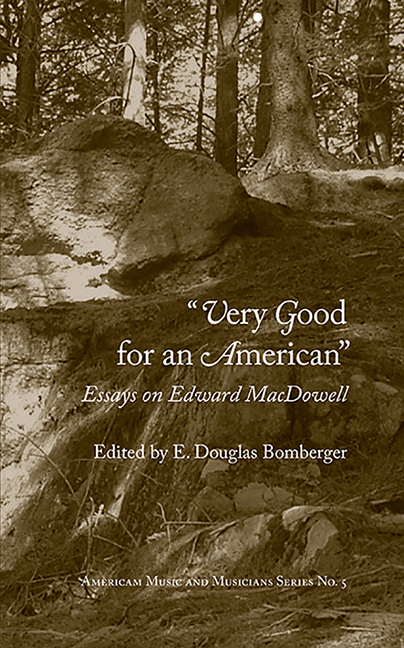Book contents
- Frontmatter
- Table of Contents
- Illustrations
- Contributors
- Acknowledgments
- Introduction: MacDowell at 150
- Edward MacDowell and the Society of Friends
- Historical Concerts in New York City, 1860-1876: An Approximation
- “No MacDowell, No Carreño”: Teresa Carreño's Contributions to the Dissemination of Edward MacDowell's Piano Music
- MacDowell, Liszt, and the Symphonic Tone Poem
- Wagnerian Influence and Motives in the Works of Edward MacDowell
- “On Sundays there was the music …” George Whitefield Chadwick between symphony and organ
- MacDowell vs. Butler: The “Idealist” Professor and the Administrator of “Materialism”
- Parallels in the Careers of Edward A. MacDowell and Chou Wen-chung
- American Bayreuth: The 1910 Peterborough Pageant and the Genesis of the MacDowell Colony
- Selective Bibliography
- Index
Edward MacDowell and the Society of Friends
- Frontmatter
- Table of Contents
- Illustrations
- Contributors
- Acknowledgments
- Introduction: MacDowell at 150
- Edward MacDowell and the Society of Friends
- Historical Concerts in New York City, 1860-1876: An Approximation
- “No MacDowell, No Carreño”: Teresa Carreño's Contributions to the Dissemination of Edward MacDowell's Piano Music
- MacDowell, Liszt, and the Symphonic Tone Poem
- Wagnerian Influence and Motives in the Works of Edward MacDowell
- “On Sundays there was the music …” George Whitefield Chadwick between symphony and organ
- MacDowell vs. Butler: The “Idealist” Professor and the Administrator of “Materialism”
- Parallels in the Careers of Edward A. MacDowell and Chou Wen-chung
- American Bayreuth: The 1910 Peterborough Pageant and the Genesis of the MacDowell Colony
- Selective Bibliography
- Index
Summary
The December 2010 MacDowell Symposium at Elizabethtown College opened with two papers on the composer's family background. The late Dr. Margery Morgan Lowens—in the last public paper of her distinguished professional career—traced the influence of Mac- Dowell's mother in broadening his worldview beyond the Quaker home where he was born. The second paper was my own essay on the Quaker faith of his father's family and their connections to the Society of Friends. These two papers were in dialogue with each other, showing the complex interaction of the dual influences on MacDowell's personality. Though Dr. Lowens’ declining health prevented her from revising her essay for inclusion in the present volume, the influence of her ideas pervades my discussion of MacDowell's Quaker heritage. Like other biographers, she followed the lead of Marian MacDowell in pointing out that Edward MacDowell was not a religious man and showed no adult interest in the faith of his father, gravitating instead to his mother's friends and interests. In this essay I will not dispute those assessments, but rather, I will look for evidence of how his early years in the 15th Street Quaker Meeting did affect his life and music. I will make the case that Quaker values and practices had a subtle, if unacknowledged, influence on this complex individual and his unique musical style.
Quaker belief and practice
The Society of Friends (or “Quakers,” as they were popularly known) arose in England during the turbulent period of civil wars in the late 1640s. Despite widespread persecution, the sect grew rapidly through the recruitment of disaffected members of other religious groups. In 1682, William Penn founded the colony of Pennsylvania as a “Holy Experiment” in religious tolerance, attracting a significant population of Quakers who spread to surrounding colonies in subsequent years. During the nineteenth and twentieth centuries, members of the Society of Friends played a significant role in movements for social justice in America, especially in education, women's suffrage, the Abolition movement, and prison reform. The nineteenth century saw several splits over questions of belief and practice, with the Hicksite branch, to which the McDowells belonged, representing the more liberal direction. The 15th Street Meeting House, where the family attended services, is still standing in mid-town Manhattan.
- Type
- Chapter
- Information
- Very Good for an AmericanEssays on Edward MacDowell, pp. 13 - 30Publisher: Boydell & BrewerPrint publication year: 2017

